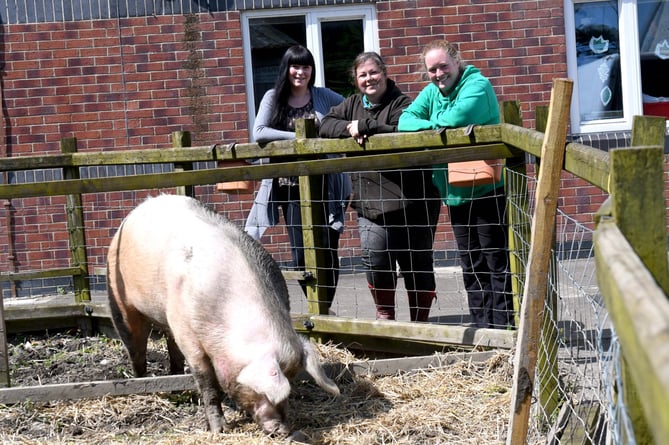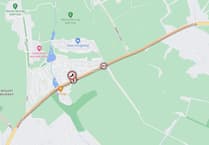Our school farm really is the jewel in our crown at Ramsey Grammar School. Our young people are so lucky to have agricultural science woven into their curriculum from Year 7 onward and have direct experience with the farm and all it has to offer. The long lasting positive impact this has upon them is clear for us to see,’ says head teacher Sarah Findlater.
And, surely, there can be few things more valuable for a youngster than learning about the work that goes into looking after livestock and growing vegetables, in the process, gaining a real understanding of the value we should put on the food this produces.
Not only that, but the children really engage with the school farm and enjoy the work there.
Marion Arthur, subject leader of rural, agriculture and environmental sciences, says: ‘I think every Year 7 that comes to us is excited to do rural science: they come to the open evenings and farm club before they even start here.
‘It is the students who run the farm under our guidance: the day to day animal care, preparation for breeding, births, rearing of livestock, growing crops and preparing plots, as well as basic farm maintenance, including fencing and building poultry pens.’
Technician, Rachel Radcliffe, and teacher, Albert Ravey, make up the teaching team on the farm. Rachel is married to local farmer, Alan Radcliffe, and says that, when she wants a day off, Alan will come in instead.
Marion says: ‘We really appreciate all the support from the farming community, businesses, individuals, many of whom are ex students.’
The farm has pigs, two sows, which breed three times every two years; 20 sheep and 25 chickens. There are two greenhouses, a polytunnel, a school orchard, six bee hives, and around vegetable plots as well as two rural science labs where the students can carry out soil analysis and test the nutrient content in feeds.
The two pigs, Ellie and Martha, and the chickens live on site, but not the sheep, though they do come back to lamb in the school’s lambing shed.
Marion says: ‘We don’t have grazing on site so at the moment our ewes are in a field belonging to an ex student in Maughold, and the tup and his friend are out at The Garey with Marion Sayle who lets us graze our sheep there.
‘We’ve got Dorset sheep because we can lamb them at any time of the year. They’re one of the only types of sheep that can breed outside of the season, so it ties in with our curriculum rather than just their cycle.
‘Otherwise everything happens around Easter time which is when our Key Stage 4 and Key Stage 5 students will be having exams. For students, that’s not a good time, so last year we were lambing end of September/early October time.
‘Economically that isn’t so great because you’ve also got to feed them, but it does mean that we’ve got something happening during the winter when nothing else is growing.’
And, as you might imagine, lambing is a time of great excitement at the school.
Marion says: ‘When we lamb, me and Rachel do the nights and then, during the day, we pass it on to the students. We have them set up as a rota and I think last time we had something like 70 students all signing up to go on the rota.’
Even head teacher Sarah got involved. She says: ‘Lambing was amazing. I’d never seen it up close before: it was really quite humbling and the farm club students that were involved in it were just so dedicated.
‘There was even an online school forum where Marion and Rachel were giving students updates and photos. It was just really special.’
Marion ‘inherited the job’ in 2008. She says: ‘My colleague John Craine started [at the school] in 1987 and he grew the farm to what it is now. But before then there had always been some kind of rural education in Ramsey Grammar School since it opened.
‘John came as a biology teacher and, because he was quite practical and hands on, he had quite a good relationship with some of the more challenging students. He was very black and white and they liked that.
‘It was suggested that maybe he could do a bit more horticultural stuff and work with animals. He said: “If we’re going to do it we’re going to do it properly”, so we had a small flock of sheep and we had some pigs and, when they built the south building, the old piggery had to be demolished to make way for the work being done so he managed to get a brand new piggery. It’s a purpose built piggery but it’s listed as a classroom so the head height has to be much higher to accommodate a viewing platform for students where they can sit and take notes.’
Rural Science is taught once a week to all students in Key Stage 3 as part of the science curriculum. Up to Year 9, which is age 14, all the students have an hour a week on it.
At Key Stage 4 they are offered Level 2 Agriculture BTEC & SQA Level 5 National Progression Awards - Rural Skills - Agriculture as an option, which is equivalent to two GCSEs at grades C - A*.
In Key Stage 5 they can take the Level 6 SQCF National Certificate - Agriculture, which is equivalent to an A Level.
Marion says: ‘Quite a few of the students will go on to agricultural college at 16 and usually a couple of sixth formers will go on to university to study agriculture. We have run a trip to the Royal Agricultural University, in Cirencester, every year with our sixth formers for the last couple of years.’
Sarah adds: ‘Because we’re the only school on the island to have a farm, we offer that collaboration with the two other out of Douglas schools, so we have students from Castle Rushen and QEII making the trip up here just for those lessons.’
Ramsey Grammar School’s farm is a member of the UK-wide School Farms Network and has won or been runner up in several awards run by the organisation including, in 2017, best secondary school farm and in 2021, school farm leader.
Sarah says: ‘We have an exceptional team lead by an exceptional farm leader, who has been recognised many times as just that. This is evident in the mounting awards we have adorning the school walls in her honour.
‘This team run the farm and care for the animals here. We also have some Staff who regularly volunteer their time to support the farm and the team who run it. Not to mention the dedicated group of young people who are a members of our farm club.
‘They go above and beyond every single day. Without them and their passion and dedication we would not be able to have such a wonderful and unique feature in our school.’




